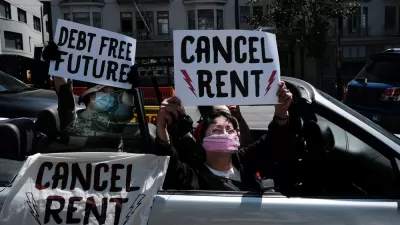From the United States to the United Kingdom, housing costs are eating up a larger percentage of household income.

According to an article by Mark Edward Rose posted on the World Economic Forum site, “There are insufficient subsidized or social homes or 'attainable' housing options for low- and middle-income households.” As Rose points out, “Looking at the heatmap of nationwide rent burden in the U.S. below, a stunning proportion of the country sees at least 30% of households rent burdened. This indicates a critical lack of supply for a range of income levels.”
While the crisis in the United States is particularly severe, other countries face similar problems. “In England, data from the Office of National Statistics reveals that only the cheapest 10% of houses are now considered affordable for the middle-income bracket.”
For many households, this means that renting is significantly cheaper per month than owning a home. “In the U.S., the cost of an average monthly home payment is now $3,322 – the average monthly new lease payment is almost $1,000 cheaper.”
According to Rose, there are four important ways the public sector can support more affordable housing. These include ‘sensible density,’ supporting the construction of denser housing in areas where it is feasible and appropriate; engaging the community to find locally sensitive solutions; implementing reforms such as reducing parking requirements that decrease the cost of housing; and building sustainable infrastructure to prepare neighborhoods for more density and protect cities from the impacts of climate change.
FULL STORY: Why the new starter home is a rental for many low and middle-income households

Alabama: Trump Terminates Settlements for Black Communities Harmed By Raw Sewage
Trump deemed the landmark civil rights agreement “illegal DEI and environmental justice policy.”

Study: Maui’s Plan to Convert Vacation Rentals to Long-Term Housing Could Cause Nearly $1 Billion Economic Loss
The plan would reduce visitor accommodation by 25% resulting in 1,900 jobs lost.

Planetizen Federal Action Tracker
A weekly monitor of how Trump’s orders and actions are impacting planners and planning in America.

Wind Energy on the Rise Despite Federal Policy Reversal
The Trump administration is revoking federal support for renewable energy, but demand for new projects continues unabated.

Passengers Flock to Caltrain After Electrification
The new electric trains are running faster and more reliably, leading to strong ridership growth on the Bay Area rail system.

Texas Churches Rally Behind ‘Yes in God’s Back Yard’ Legislation
Religious leaders want the state to reduce zoning regulations to streamline leasing church-owned land to housing developers.
Urban Design for Planners 1: Software Tools
This six-course series explores essential urban design concepts using open source software and equips planners with the tools they need to participate fully in the urban design process.
Planning for Universal Design
Learn the tools for implementing Universal Design in planning regulations.
Caltrans
Smith Gee Studio
Institute for Housing and Urban Development Studies (IHS)
City of Grandview
Harvard GSD Executive Education
Toledo-Lucas County Plan Commissions
Salt Lake City
NYU Wagner Graduate School of Public Service





























